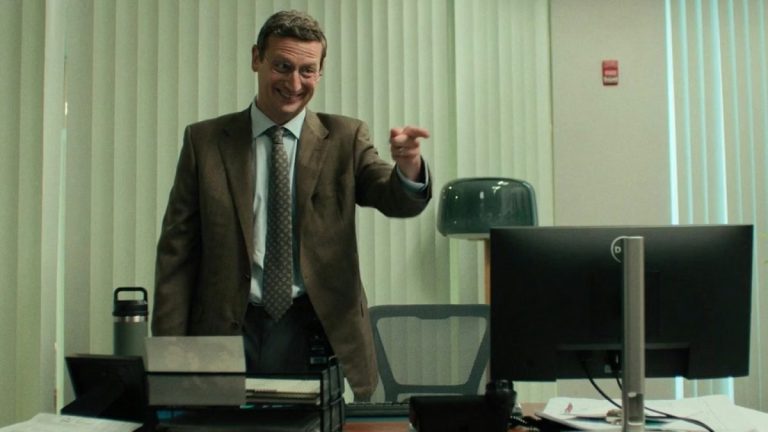“Relay” is an accomplished conspiracy thriller that echoes “New Hollywood” classics like “Three Days of the Condor” or “The Parallax View,” as it’s an examination of a whistleblower’s attempts to survive an all-powerful system. The difference between the 1970s and the 21st century is that now corporations and businesses are just as influential as governments; in fact, the secrecy involved in an employer-led manhunt is more terrifying than legal persecution, as a private company does not have to abide by the rules of the judiciary.
While “Relay” makes a fatal mistake in its final act that invalidates much of the worldbuilding that it had already established, it’s still a worthwhile watch that serves as a compelling revamp of a quintessential subgenre.
Riz Ahmed stars as Ash, a “fixer” for a powerful corporation who helps form secret arrangements on its behalf. After being assigned to extract pertinent information from the whistleblower, Sarah (Lily James), Ash stumbles upon a conspiracy that could have significant ramifications for both his employer and the food service market that it exists within.
Although Ash’s job is to literally relay information between clients, he finds himself on the run after befriending Sarah, recognizing that her information could be leveraged. However, Ash faces personal threats from many of his former superiors, including Rosetti (Walla Fitzgerald) and Dawson (Sam Worthington).
“Relay” is a return to form for director David Mackenzie, who is able to do excellent work when given a strong screenplay to work off of, as was the case with the neo-western “Hell or High Water” and the brutal prison drama “Starred Up.” Mackenzie crafts an electrifying film that goes deep within the complex process of collecting, disseminating, and analyzing information, combining the paranoia-tinged thrills of Alan J. Pakula with the attention to detail of Steven Soderbergh.
Given that “Relay” involves fictitious companies and ambiguous products, there is a degree of hoakiness that may be inherent. However, “Relay” is able to limit the audience’s perspective to what Ash is aware of, which helps avoid any broader conversations about the world context that surrounds the film’s narrative.

Ahmed has been a gifted actor who has only gotten better as he continues. “Relay” is yet another opportunity for him to play an intense, focused professional in the vein of “Nightcrawler,” “The Sound of Metal,” “Mogul Mowgli,” or even “The Sisters Brothers.” Ahmed’s ability to rattle off complex blocks of information is impressive, as there is never a point at which Ash’s hyper-awareness feels like a gimmick used to get through expositional chunks.
In fact, it’s the ease with which Ash can complete orders that makes him a compelling protagonist once he is forced to make ethical decisions by himself. Although there are some clumsy attempts at tacking on a sympathetic backstory in order to give the viewers more reason to invest in Ash, Ahmed works best when implying a greater history to the character that is left somewhat ambiguous.
Although Sarah often feels like more of a MacGuffin than she does a character, James succeeds in giving a grounded, emotionally intelligent performance that captures the anxiety faced by someone faced with an ethical burden. “Relay” features some strong supporting performances from reliable character actors like Victor Garber and Matthew Maher.
The most surprising feat of acting is from Worthington, who makes the case for himself as a far more versatile performer than some of his post-”Avatar” roles would suggest. While Worthington has a stoic sense of honor and paternal instincts that make him the ideal choice to play Jake Sully, “Relay” is able to subvert these qualities in order to make him the public face of an insidious corporation.
“Relay” is more successful with its creative set pieces than it is with action scenes, as there’s a lot of fun to be had with Ash as he puts his hacking, deception, and infiltration skills to good use. Although the ethics of his plight often play too minor a role, “Relay” at least justifies some of Ash’s short-sighted decisions by suggesting he literally has not had enough time to think through his options.
The inclusion of more action is ironically detrimental to the stakes, as it suggests an urgency to the plot that is better conveyed through implication. It also doesn’t help that there have been more than a few crime thrillers set in New York City that feature kinetic foot chases. While shooting on location certainly aided “Relay” in feeling authentic, there’s nothing about its action that feels particularly groundbreaking.

Given how immersive “Relay” is at dropping the audience into a dynamic situation with only a fraction of context, it’s almost impressive how significantly the third act is fumbled. “Relay” makes some rather astute points about the inherent challenges that whistleblowers face, as their revelations will only become impactful if there is a public that is willing to hold powerful people accountable.
In a world where military, government, corporate, and media entities have become intertwined, it becomes far easier to sweep any major controversies under the rug before they become scandalous. However, this nuanced understanding of reality is betrayed by a series of plot twists that seem inserted purely to take the audience by surprise. Even if there is flimsy logic meant to justify the revelations, it completely negates the emotional logic on which the film’s first two acts were reliant.
Beyond the structural faults within the final stretch of “Relay,” the film seems to almost immediately shift from being a tactile thriller to something far more procedural. Characters that felt three-dimensional begin speaking in generic phrases and make the type of decisions that are required by the plot. The direction even seems to take a blow, as Mackenzie seems to have given up on offering any semblance of realism. While it’s possible to be more lenient on an independent film that doesn’t have the resources to pull off some more ambitious feats, the faults within “Relay” are entirely creative, as a ballooned budget wouldn’t have been able to fix bad writing.
Even though it may leave a sour taste in viewers’ mouths, “Relay” is a propulsive piece of entertainment that takes a cinematic approach to a premise that could have easily been utilized within a network television show. It’s admirable that Mackenzie was willing to make something so specific with an eye towards mainstream appeal, but the blunderous ways that it wraps up may indicate why these types of films have become so rare.




![Columbus [2017] – A Soulful Tribute to Human Connection and Architecture](https://79468c92.delivery.rocketcdn.me/wp-content/uploads/2017/11/cover-1-768x432.jpg)

![Riverdance: The Animated Adventure [2022] Review – A Forgettable Movie About Death, Tap Dance And Magical Elks](https://79468c92.delivery.rocketcdn.me/wp-content/uploads/2022/01/Riverdance-The-Animated-Adventure-3-768x432.jpg)

